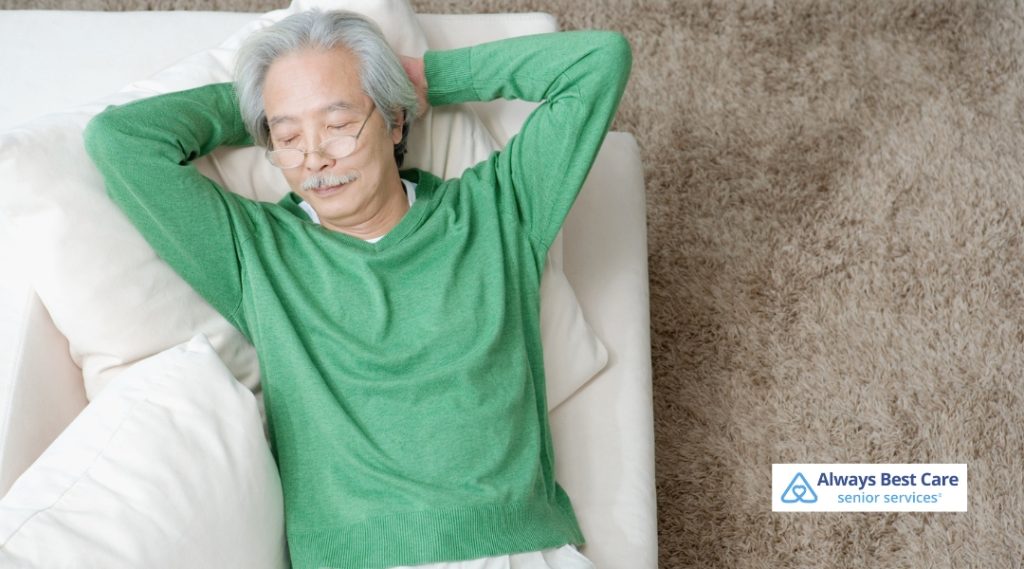A Senior’s Guide to Restful Sleep: 6 Ways to Ease Insomnia in Memphis, TN

Many seniors find themselves facing sleepless nights. Whether it’s trouble falling asleep, waking up too early, or feeling unrested despite a full night in bed, insomnia can take a real toll on energy, mood, and overall health.
But restful sleep is still possible. With a few thoughtful changes and the right support, seniors in Memphis can enjoy more peaceful nights and brighter days. Our guide shares six practical ways to ease insomnia, tailored to meet the unique needs of seniors.
Table of Contents
Why Insomnia Happens More Often With Age
As we grow older, it’s common for sleep to become lighter, shorter, and more easily disrupted—but for many seniors, these changes can lead to chronic insomnia. One major reason is that the body naturally produces less melatonin with age. Melatonin is the hormone that helps regulate the sleep-wake cycle, and when levels drop, it becomes harder to fall asleep and stay asleep.
In addition to hormonal shifts, many seniors face health conditions that interfere with rest. Chronic pain, arthritis, heart disease, and neurological disorders like Parkinson’s or dementia can make it uncomfortable or difficult to remain asleep through the night. Nighttime trips to the bathroom become more frequent due to age-related changes in the bladder or side effects from medications.
Mental health can also play a role. Seniors often experience increased anxiety, loneliness, or grief—all of which can disrupt the ability to relax and fall asleep. And let’s not forget the influence of daily routines: less exposure to daylight, reduced physical activity, or irregular sleep habits can throw off the body’s internal clock, making it harder to feel sleepy at the right time.
Understanding why insomnia becomes more common with age helps shine a light on what can be done about it. With a mix of healthy lifestyle choices, support from caregivers, and professional guidance, many seniors can regain restful, restorative sleep.

1. Build a Consistent Sleep Routine
Establishing a steady sleep schedule is one of the simplest yet most powerful ways to improve rest. Going to bed and waking up at the same time every day—even on weekends—helps regulate your body’s internal clock, making it easier to fall asleep naturally and wake up feeling refreshed.
Incorporate a calming bedtime ritual to signal to your body that it’s time to wind down. This might include reading a book, listening to soft music, or doing gentle stretches. Avoid stimulating activities like watching television or using electronic devices too close to bedtime, as these can make it harder to fall asleep.
2. Design a Bedroom That Encourages Deep Sleep
Your bedroom should be a place of peace and comfort. A quiet, cool, and dark environment supports deeper, more restorative sleep. Blackout curtains can help block unwanted light, while a fan or white noise machine can mask outside noise that might disturb your rest.
Investing in a supportive mattress and pillows can also make a big difference, especially if you deal with back, joint, or neck pain. Keep clutter out of the bedroom and reserve the space for rest and relaxation to help your brain associate it with sleep.

3. Watch What You Eat—and When
Diet has a direct effect on sleep quality, particularly in the hours leading up to bedtime. Caffeine and alcohol should be limited later in the day, as both can interfere with the ability to fall asleep or stay asleep.
Try to eat your final meal of the day at least two to three hours before bed. Heavy or spicy foods can cause discomfort and disrupt digestion, making it harder to settle down. If you’re hungry later in the evening, a light, sleep-friendly snack like a banana or a handful of almonds can help keep you comfortable without disturbing your rest.
4. Stay Active to Sleep More Soundly
Daily movement is one of the best ways to support healthy sleep, especially for seniors. Physical activity helps reduce stress, improve mood, and regulate your body’s natural sleep-wake cycle. Whether it’s a morning walk around the neighborhood, light stretching, gardening, or chair exercises, staying active during the day can help you fall asleep faster and enjoy deeper rest at night.
Try to finish any exercise at least a few hours before bedtime to give your body time to wind down. Even gentle activity can make a noticeable difference in sleep quality over time.

5. Calm Your Mind to Sleep Peacefully
As night falls, worries and racing thoughts often become more noticeable. Managing mental stress is essential for restful sleep. Simple relaxation techniques—like deep breathing, mindfulness, or listening to calming music—can quiet the mind and prepare your body for rest.
A warm bath, a few minutes of meditation, or even journaling your thoughts before bed can help release tension and make it easier to drift off. Creating a peaceful evening routine that prioritizes relaxation can turn bedtime into a calming, welcome part of the day.
6. Take a Closer Look at Your Medications
Many medications—especially those commonly used by seniors—can interfere with sleep without you realizing it. Diuretics may increase nighttime bathroom trips, while some heart or pain medications can cause restlessness or vivid dreams that wake you up.
If you’re having trouble sleeping, talk to your doctor or pharmacist about the medications you’re taking. They can help you identify which ones might be affecting your rest and explore safer alternatives or different dosing schedules. Never make changes on your own—professional guidance is key to finding the right balance between managing health and protecting your sleep.

How In-Home Care Can Support Better Sleep Habits
Our Always Best Care team knows that a good night’s sleep is essential to feeling your best—physically, mentally, and emotionally. That’s why our team is dedicated to helping seniors develop and maintain healthy sleep habits through compassionate, personalized support delivered right at home.
Our experienced caregivers can assist with evening routines that promote relaxation and consistency. Whether it’s helping with bathing, preparing a light bedtime snack, or reminding clients to take medications at the right time, we ensure that every step of the nightly wind-down is calm, comforting, and tailored to each person’s needs.
We also help create a peaceful home environment that supports restful sleep. From dimming lights and minimizing noise to making sure the bedroom is safe and comfortable, our team is there to ease anxiety and set the stage for uninterrupted rest.
But perhaps most importantly, our caregivers provide companionship—one of the most powerful antidotes to nighttime stress and loneliness. Knowing someone is there brings comfort, reduces worry, and helps seniors in Memphis feel secure and supported as they settle in for the night.
Consider the Benefits of In-Home Care in Memphis
For seniors who experience anxiety, loneliness, or difficulty managing daily routines, an in-home caregiver can provide valuable support. Assistance with evening routines, medication reminders, and companionship can create a sense of stability and comfort, making it easier to relax and sleep better.
At Always Best Care of Memphis, we understand the challenges that come with aging, including sleep difficulties. Our compassionate caregivers can help establish a calming nighttime routine, assist with daily activities, and provide companionship to reduce stress and promote relaxation.
If you or a loved one is struggling with insomnia and needs extra support, we are here to help. Contact Always Best Care of Memphis at (901) 414-2388 to schedule a care consultation and learn how our in-home care services can improve your quality of life. A restful night’s sleep is just a call away.





